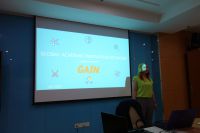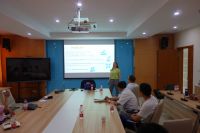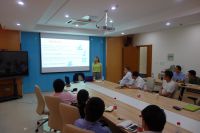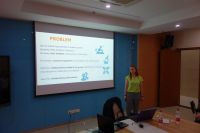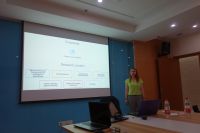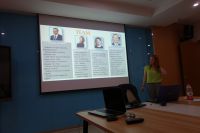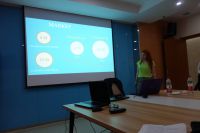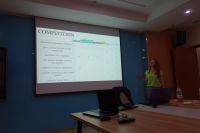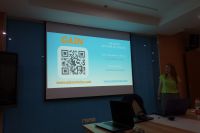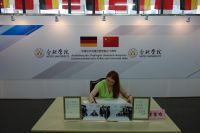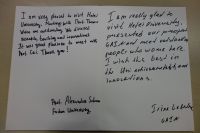It is often not easy for researchers to find other scientists to partner with for projects or to share expensive equipment with. Academic researchers also often find it hard to get in touch with industry partners to turn theoretical or fundamental research into real products, whereas small and mid-sized companies have a hard time discovering and teaming up with scientists to find answers to their research problems. On Monday, 2019-07-08, Mrs. Irina Lebedeva, COO of GAIN and PhD candidate in Computer Science and Artificial Intelligence at the East China University of Science and Technology (ECUST) [华东理工大学] in Shanghai, gave the talk "GAIN – The Global Academic Innovation Network" at 10:45 in Room 210 of the Sino-German Incubator of our Hefei University (the newly renovated Building 33). GAIN answers the above-mentioned problems by providing a comprehensive web platform, bringing together researchers from different domains, faculties, and universities as well as industry partners. We are thankful to Mrs. Lebedeva for her introduction into this helpful and indeed very needed platform, as well as for her work to develop and conceptualize it together with Prof. Dr. Alexander A. Solovev – who gave his talk "Man-Made Nano- and Micromachines" at the same meeting.
Abstract.
GAIN, the Global Academic Innovation Network, aims to bring together scientists, inventors, investors, and companies. One goal of GAIN is to help the research community to collaborate more efficiently, both in terms of scientific skills as well in making better use of expensive equipment. It can help scientists to connect to colleagues from other departments within the same university, other universities, or even industry partners to share expertise and/or equipment. This means, for example, that a researcher in material science can now easily find a colleague from the field of machine learning or operations research in order to make use of their methods to develop new, better materials, which, vice versa, allows the computer scientist to apply their knowledge to some challenging and very interesting real-world task. By sharing expensive equipment (or even discovering that another group nearby may have exactly the expensive equipment that a scientist needs), research funding can be spent more efficiently and we researchers can improve the "results per investment" for the society. GAIN also assists researchers to find partners for joint grant applications, to join existing projects, or to search for equipment, expertise. Once partners have discover each other, their collaboration can not just lead to new results and the publication of papers, but also in completely new ideas, And, as a result, realize bigger ideas and, hence, to joint project and funding applications. This holds not just for collaborations within the same discipline, but may be a very obvious outcome of inter-disciplinary collaboration, e.g., as in the case of the material scientist/computer scientist example above. Moreover, GAIN helps academics with patent application, to connect to investors, and to companies interested in inventions. Besides, companies can post challenges and award cash for solution of problems. For scientists, it is often not easy to establish a connection to the industry and industrial R&D departments often have only a limited amount of well-known partners in universities. The GAIN platform therefore offers both sides the chance to establish contact and to team up to turn excellent research into excellent products. GAIN is indeed a great idea with high potential. I already created a profile for myself there.
Short Bio
 Mrs. Irina Lebedeva received her Bachelor’s Degree in Computer Science and Engineering from the National Research Nuclear University (MEPhI, Moscow Engineering Physics Institute) [Национальный исследовательский ядерный университет «МИФИ»] in 2009. In 2017, she attained a Master’s Degree in Computer Science from the Shanghai Jiaotong University (SJTU) [上海交通大学]. Currently, she is a PhD Candidate in Computer Science at the East China University of Science and Technology (ECUST) [华东理工大学] in Shanghai, where she conducts research in AI. Besides her academic career, Mrs. Lebedava also has outstanding industrial experience. From 2006 to 2010, she worked as Software Engineer at Yandex, which is maybe the most well-known Russian IT company, the Russian Baidu, if you want. She then was Senior Software Engineer for 2.5 years at the Schneider Group. Besides being an excellent software developer, Mrs. Lebedeva has a passion for creating AI and computer vision products, and has practically applied several SVM- and deep learning approaches in real-world products. Mrs. Lebedeva holds the position as Chief Operating Officer of GAIN, the Global Academic Innovation Network.
Mrs. Irina Lebedeva received her Bachelor’s Degree in Computer Science and Engineering from the National Research Nuclear University (MEPhI, Moscow Engineering Physics Institute) [Национальный исследовательский ядерный университет «МИФИ»] in 2009. In 2017, she attained a Master’s Degree in Computer Science from the Shanghai Jiaotong University (SJTU) [上海交通大学]. Currently, she is a PhD Candidate in Computer Science at the East China University of Science and Technology (ECUST) [华东理工大学] in Shanghai, where she conducts research in AI. Besides her academic career, Mrs. Lebedava also has outstanding industrial experience. From 2006 to 2010, she worked as Software Engineer at Yandex, which is maybe the most well-known Russian IT company, the Russian Baidu, if you want. She then was Senior Software Engineer for 2.5 years at the Schneider Group. Besides being an excellent software developer, Mrs. Lebedeva has a passion for creating AI and computer vision products, and has practically applied several SVM- and deep learning approaches in real-world products. Mrs. Lebedeva holds the position as Chief Operating Officer of GAIN, the Global Academic Innovation Network.



